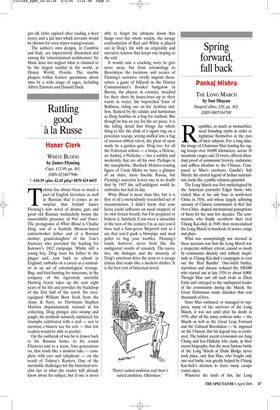Rattling good à la Russe
Honor Clerk
WHITE BLOOD by James Fleming Cape, £12.99, pp. 361, ISBN 0224077996 ✆ £10.39 (plus £2.45 p&p) 0870 429 6655 Tolstoy has always been so much a part of English literature as well as Russian that it comes as no surprise that behind James Fleming’s new novel of drama, guts and good old Russian melancholy looms the unavoidable presence of War and Peace. The protagonist of White Blood is Charlie Doig, son of a Scottish Moscow-based cotton-broker father and of a Russian mother, grand-daughter of the Tsar’s financier who provided the backing for Kutosov’s 1812 campaign. Whilst still a young boy, Doig loses his father to the plague and, sent back to school in England, embarks on a career as a naturalist in an act of entomological revenge. Bugand bird-hunting for museums, in the company of the rigorously scientific Hartwig Goetz takes up the next eight years of his life and provides the backdrop of the first half of the novel. No overequipped William Boot fresh from the Army & Navy, no Darwinian Stephen Maturin dispassionately rational in his collecting, Doig plunges into swamp and jungle, his methods minutely explained, his triumphs celebrated with a zeal — not to mention a bizarre use for eels — that few readers would be able to predict.
On the outbreak of war he is drawn back to his Russian home, to his cousin Elizaveta and to a scene, four generations on, that reads like a modern take — complete with cars and telephone — on the world of Tolstoy’s Rostovs. One of the inevitable challenges for the historical novelist lies in what the reader will already know about his subject, but if one is never able to forget the ultimate doom that hangs over this whole society, the savage confrontation of Red and White is played out in Doig’s life with an originality and narrative tension that keeps one hoping to the end.
It would ruin a cracking story to give more away, but from entomology to Revolution the locations and scenes of Fleming’s narrative vividly imprint themselves: a game of billiards in the District Commissioner’s flooded bungalow in Burma, the players in coracles, steadied for their shots by house-boys up to their waists in water; the bejewelled Emir of Bokhara, riding out on his Arabian stallion, flanked by his salukis and hawksman as Doig fumbles in a bog for mallard. But though he has an eye for the set piece, it is the telling detail that brings the whole thing to life: the clink of a signet ring on a porcelain teacup, sewing stuffed into a bag of maroon ribbed velvet, the pleat of snow made by a garden gate. Doig too, for all the Tolstoyan echoes — a Sonja, a Helene, an Andrej, a Nicholas — has a solidity and modernity that are all his own. Perhaps in the xenophobic, Sherlock Holmes-reading figure of Uncle Misha we have a glimpse of an older, more bucolic Russia, but Fleming’s narrative leaves one in no doubt that by 1917 the self-indulgent world he embodies has had its day.
White Blood is more than this, but it is first of all a meticulously researched act of reconstruction. I didn’t know that your horse could suffocate on nasal stoppers of its own frozen breath, but I’m prepared to believe it. Similarly if you were a naturalist at the turn of the century I’m as sure you’d have had a lime-green Skyproof tent as I am that you’d pack a blowpipe and mud pellet to bag your warbler. Fleming’s touch, however, never feels like the undigested results of research. The narrative, the dialogue and the intensity of Doig’s emotions drive the story to a savage climax that reads like a modern thriller. It is the best sort of historical novel.










































































 Previous page
Previous page